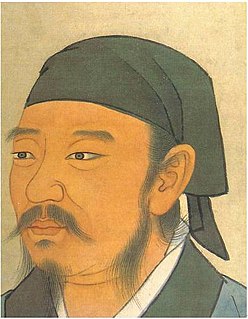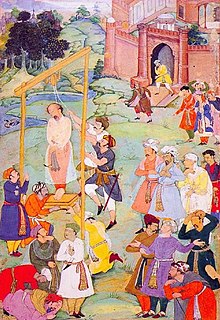A Quote by Hasdai ibn Shaprut
If one is cruel to himself, how can we expect him to be compassionate with others?
Related Quotes
It is thus religion infatuates man from his infancy, fills him with vanity and fanaticism: if he has a heated imagination it drives him on to fury; if he has activity, it makes him a madman, who is frequently as cruel to himself, as he is dangerous and incommodious to others: if, on the contrary, he be phlegmatic or of a slothful habit, he becomes melancholy and is useless to society.
No one who passively endures an injustice against himself has the material in him to struggle for the rights of others. The one who patiently forbears becomes an accessory to the injustice done to others. He who resists the injustice which he himself meets can open up the way to a higher right for others.
In the Name of Allah the Merciful, the Compassionate, Who manifests Himself through everything, the revelation of a clear knowing to whomsoever He wishes, peace be upon you, my son. This praise belongs to Allah Who manifests Himself on the head of a pin to whom He wishes, so that one testifies that He is not, and another testifies that there is none other than He. But the witnessing in the denying of Him is not rejected, and the witnessing in the affirming of Him is not praised.
Life is a system of relations rather than a positive and independent existence; and he who would be happy himself and make others happy must carefully preserve these relations. He cannot stand apart in surly and haughty egoism; let him learn that he is as much dependent on others as others are on him.
Jesus disclosed that God is compassionate. Jesus spoke of God that way: "Be compassionate, as God is compassionate." Compassion is the primary quality of the central figures in two of his most famous parables: the father in the parable of the Prodigal Son and the Good Samaritan. And Jesus himself, as a manifestation of the sacred, is often spoken of as embodying compassion.
A man who lies to himself, and believes his own lies becomes unable to recognize truth, either in himself or in anyone else, and he ends up losing respect for himself and for others. When he has no respect for anyone, he can no longer love, and, in order to divert himself, having no love in him, he yields to his impulses, indulges in the lowest forms of pleasure, and behaves in the end like an animal. And it all comes from lying - lying to others and to yourself.
Wine makes a man better pleased with himself. I do not say that it makes him more pleasing to others. Sometimes it does. But the danger is, that while a man grows better pleased with himself, he may be growing less pleasing to others. Wine gives a man nothing. It neither gives him knowledge nor wit; it only animates a man, and enables him to bring out what a dread of the company has presented.
The person who is living by grace sees this vast contrast between his own sins against God and the offenses of others against him. He forgives others because he himself has been so graciously forgiven. He realizes that, by receiving God’s forgiveness through Christ, he has forfeited the right to be offended when others hurt him.







































